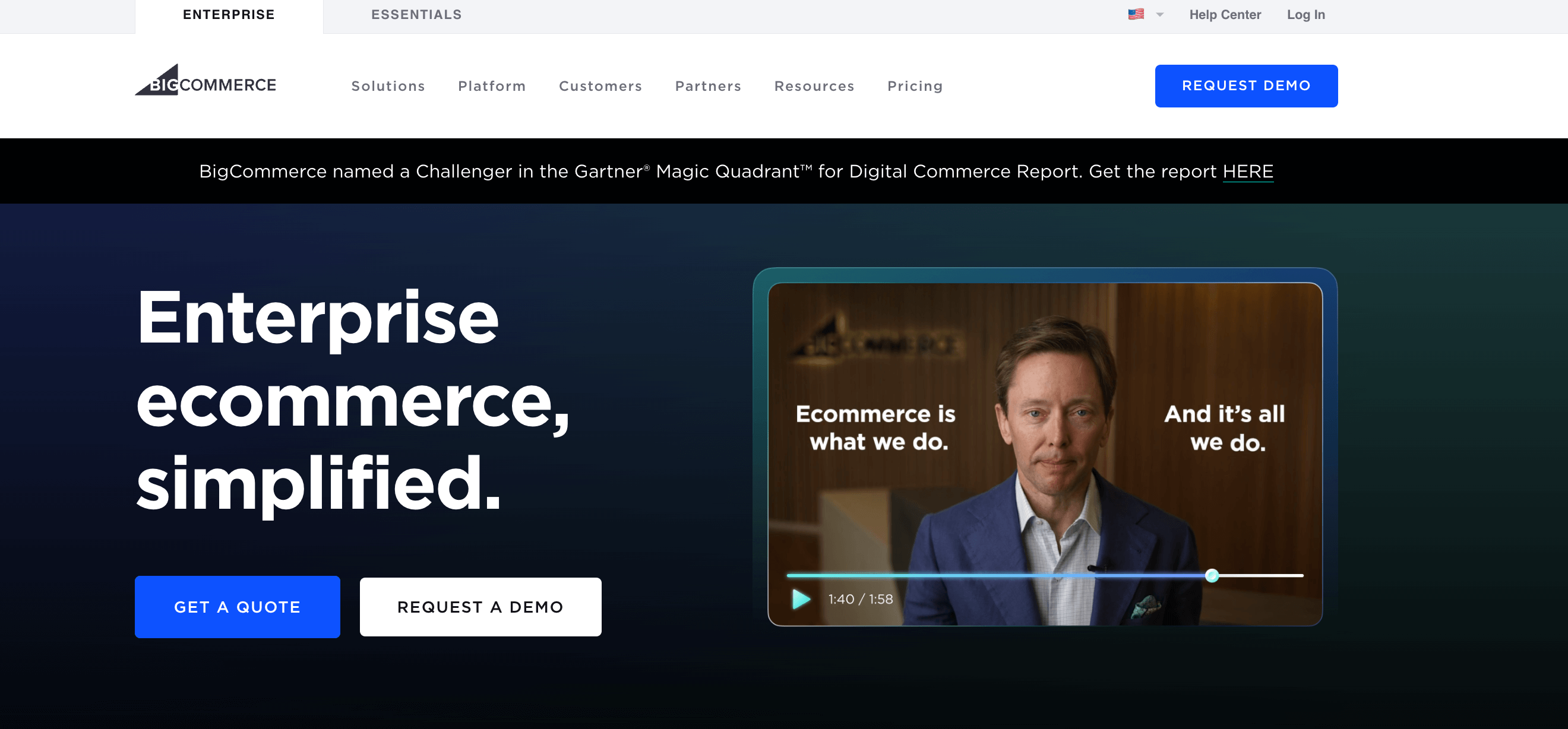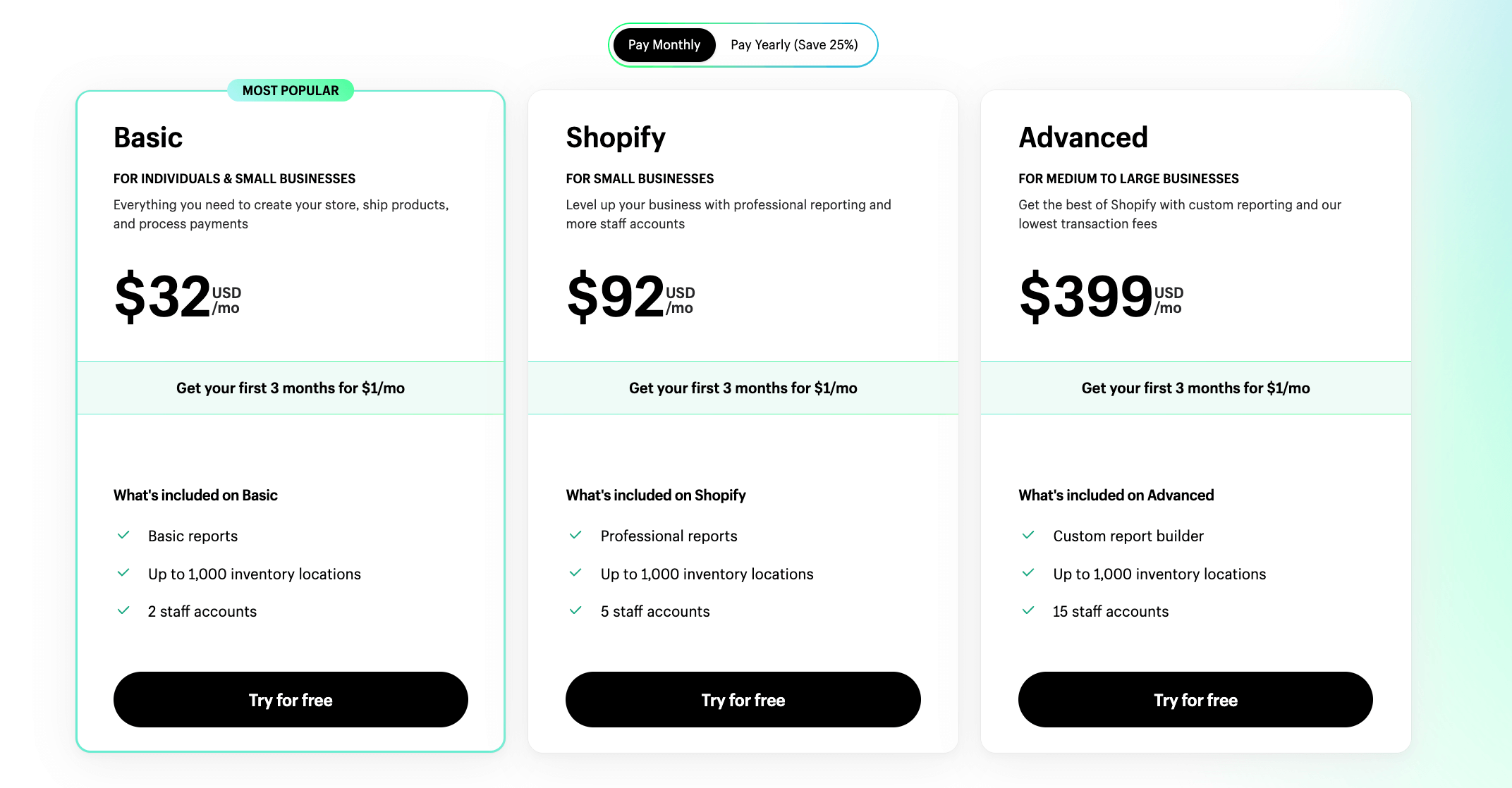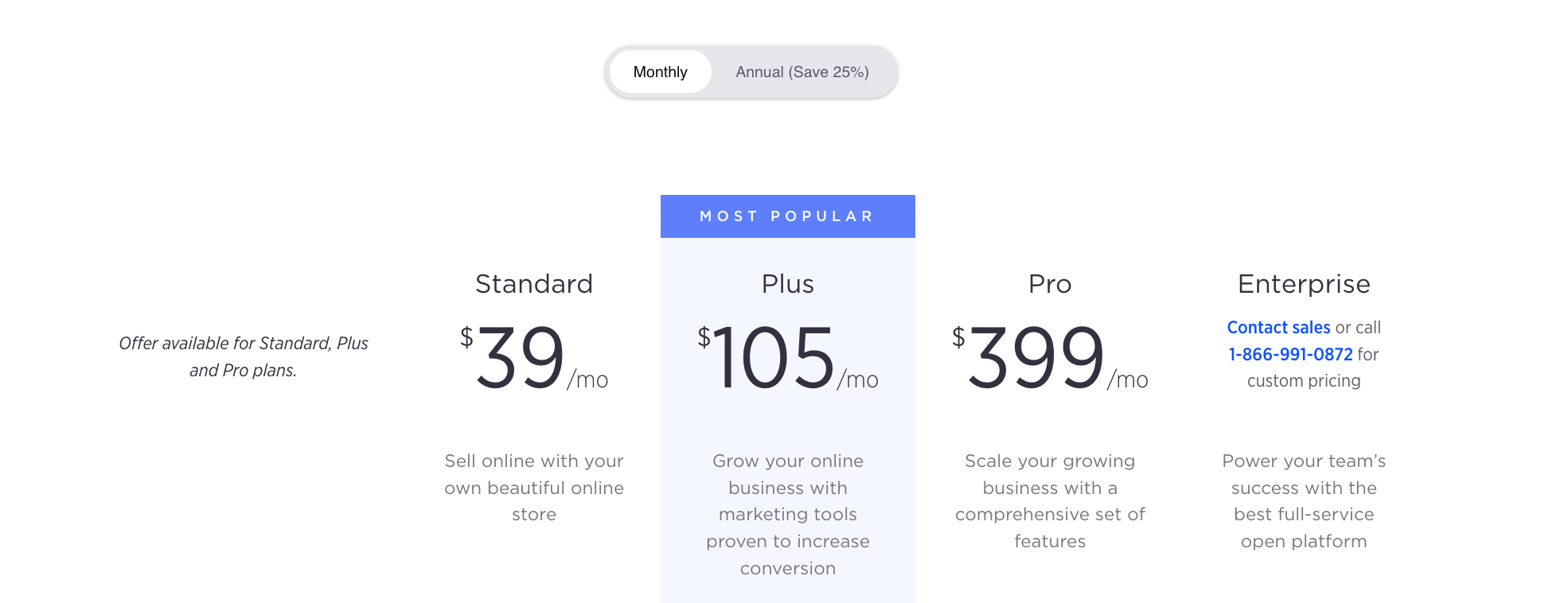BigCommerce vs Shopify: Choosing the Right E-commerce Platform in 2023
 October 16, 2023
October 16, 2023 In today's digital age, having a strong online presence is crucial for businesses of all sizes. An essential component of this online presence is an e-commerce platform, which allows businesses to sell their products or services online. With so many e-commerce platforms available, it can be overwhelming to choose the right one. In this article, we will dive deep into two popular e-commerce platforms: BigCommerce vs Shopify.
Why Choosing the Right E-commerce Platform is Crucial
Selecting the right e-commerce platform is a decision that can significantly impact the success of your online business. A well-chosen platform provides a seamless user experience, robust features, and scalability to support your business as it grows. On the other hand, a poorly chosen platform can result in a frustrating shopping experience for customers, limited functionality, and ultimately hinder your business's growth potential.
Factors to Consider When Selecting an E-commerce Platform
Before delving into BigCommerce and Shopify, it is essential to understand the factors you should consider when evaluating e-commerce platforms. These factors include:
When choosing an e-commerce platform for your online business, there are several critical factors that warrant careful consideration. Two of the most pivotal aspects are "Ease of Use and Scalability" and "Design and Customization Options." Let's explore why these factors are integral to your decision-making process.
Ease of Use and Scalability:
- User-Friendliness: The ease of use of an e-commerce platform is paramount, especially for small business owners or those new to e-commerce. A user-friendly interface, intuitive navigation, and a straightforward setup process can save time and minimize frustration. Shopify, for instance, is known for its simplicity, making it an excellent choice for beginners.
- Scalability: As your business grows, your e-commerce platform must be able to accommodate increasing demands. A scalable platform can handle a growing product catalog, more site traffic, and more complex operations. BigCommerce, with its focus on scalability and flexibility, is a prime example.
- Technical Support: Consider the level of customer support provided. Responsive and reliable technical support can be a lifeline when facing challenges or questions about the platform.
- Resource Allocation: Assess the technical expertise of your team. Some platforms are more user-friendly, while others require advanced technical knowledge. Choose one that aligns with your in-house capabilities.
Design and Customization Options:
- Responsive Design: In the mobile-centric world, a responsive design is non-negotiable. Ensure your chosen platform offers mobile-friendly templates, allowing your site to adapt to various devices.
- Templates and Themes: Explore the variety and quality of templates and themes provided by the platform. Customizable themes can save time and effort in design, while a marketplace for third-party themes can expand your design options.
- Customization: Consider the level of customization available. The ability to personalize your website to align with your brand's unique identity is crucial. Platforms like WooCommerce and Magento are highly flexible for those who require extensive customization.
- Integration with Third-party Tools: Check if the platform integrates seamlessly with third-party design and customization tools. This extends your design options and ensures you can employ the best solutions for your specific needs.
- Scalability in Design: Your platform should also support the scalability of design. As your business evolves, you may want to update the look and feel of your website. A platform with flexible design options can help you stay visually appealing to your audience over time.
In conclusion, the factors of "Ease of Use and Scalability" and "Design and Customization Options" play a crucial role in your choice of an e-commerce platform. Finding the right balance between user-friendliness, scalability, design flexibility, and customization capabilities is essential to meeting your business's unique requirements and ensuring long-term success in the ever-evolving world of e-commerce. Carefully evaluate your specific needs and business goals in these areas to make an informed decision that aligns with your vision and your customers' expectations.
An Overview of BigCommerce and Shopify
Now that we have discussed the factors to consider when selecting an e-commerce platform let's take a closer look at BigCommerce and Shopify.
BigCommerce
BigCommerce is a leading e-commerce platform known for its robust features and scalability. It offers a user-friendly interface that makes it easy for businesses to set up an online store. BigCommerce provides a wide range of built-in features, including product management, marketing tools, and secure payment gateways. Additionally, it offers a variety of professionally designed templates and customization options to create a visually appealing online store.
Shopify
Shopify is another popular e-commerce platform that is widely known for its simplicity and ease of use. It offers a user-friendly interface and a drag-and-drop builder, making it easy for businesses to set up and manage their online stores. Shopify provides a range of features, including inventory management, marketing tools, and secure payment gateways. It also offers a vast marketplace of apps and themes, allowing businesses to customize their online stores according to their specific needs.
Feature Comparison between BigCommerce and Shopify
When deciding between BigCommerce and Shopify, it is essential to consider the features each platform offers. Let's compare some key features of both platforms:
1. Product Management
Both BigCommerce and Shopify offer robust product management capabilities. They allow businesses to easily add and manage products, set pricing, and track inventory. However, BigCommerce has an advantage when it comes to handling larger product catalogs and complex inventory needs.
2. Design and Customization
Both platforms offer a variety of professionally designed templates and customization options. However, Shopify's marketplace of apps and themes provides a wider range of options for customization, allowing businesses to create a more unique and tailored online store.
3. Payment Gateways
Both BigCommerce and Shopify support multiple payment gateways, including popular options like PayPal and Stripe. However, Shopify offers a more extensive list of supported payment gateways, giving businesses more flexibility in choosing the payment methods that best suit their customers' preferences.
Pricing Comparison between BigCommerce and Shopify
Selecting the right e-commerce platform is a pivotal decision for online businesses. Two of the most popular options in the market are BigCommerce and Shopify. Both platforms offer robust features and tools to help you build and manage your online store, but pricing plays a crucial role in the decision-making process. This paragraph will delve into a comprehensive pricing comparison between BigCommerce and Shopify to help you make an informed choice.
Shopify
Shopify is renowned for its user-friendly interface and a wide range of templates that cater to businesses of all sizes. In terms of pricing, Shopify offers three primary plans: Basic, Shopify, and Advanced Shopify. The Basic plan starts at $29 per month, while the Shopify plan costs $79 per month. The Advanced Shopify plan, designed for larger enterprises, is priced at $299 per month.
These plans cover essential e-commerce features, including an online store, website builder, and the ability to add an unlimited number of products. However, it's worth noting that these prices don't include additional transaction fees, which can range from 0.5% to 2% per sale, depending on the chosen plan. This cost can add up, especially for businesses with high transaction volumes.
Shopify also offers a Lite plan for $9 per month, which allows you to sell on social media platforms and integrate a "Buy" button on your website, but it doesn't provide a full online store solution.
BigCommerce
BigCommerce is a robust e-commerce platform that focuses on scalability and flexibility. Its pricing model is slightly different from Shopify's, with four primary plans: Standard, Plus, Pro, and Enterprise. The Standard plan starts at $29.95 per month and is designed for small businesses, offering features like unlimited products, multi-channel selling, and mobile-optimized stores. The Plus plan, at $79.95 per month, adds advanced features like abandoned cart recovery and customer segmentation. The Pro plan, priced at $299.95 per month, is ideal for growing businesses and includes features such as faceted search, custom SSL, and Google customer reviews. The Enterprise plan is available for larger enterprises and is tailored to specific business needs.
One notable advantage of BigCommerce is that it doesn't charge any transaction fees, unlike Shopify. This means that you can save on each sale and have more predictable monthly expenses. However, it's essential to note that custom pricing may apply for Enterprise-level solutions, as they are highly customizable and tailored to individual business requirements.
Comparing the Two: Shopify vs BigCommerce
When comparing Shopify and BigCommerce in terms of pricing, it's clear that Shopify's entry-level plan is slightly more affordable. Still, it does come with transaction fees. BigCommerce, on the other hand, offers a more competitive pricing structure, especially for businesses with higher transaction volumes, as it doesn't impose additional transaction charges. Additionally, BigCommerce's Pro and Enterprise plans are known for their extensive capabilities, making them an attractive choice for larger businesses with complex requirements.
Ultimately, the choice between BigCommerce and Shopify should not be solely based on pricing. Factors such as the size and nature of your business, your technical expertise, and your specific feature requirements should also be considered. Both platforms offer a range of powerful tools, and the decision should be made after a thorough evaluation of your unique needs and goals. Moreover, many businesses find it beneficial to take advantage of the free trial periods offered by both platforms to get hands-on experience and assess which one aligns best with their e-commerce aspirations.
BigCommerce vs Shopify Plus: Which is Suitable for Enterprise-level Businesses?
For enterprise-level businesses, both BigCommerce and Shopify offer advanced solutions. However, there are some differences to consider when choosing between BigCommerce and Shopify Plus:
BigCommerce Enterprise
BigCommerce Enterprise is a scalable solution designed to meet the complex needs of enterprise-level businesses. It offers advanced features, including multi-store management, custom SSL certificates, and dedicated account management. BigCommerce Enterprise also provides a flexible pricing structure based on individual business requirements.
Shopify Plus
Shopify Plus is Shopify's enterprise-level solution, offering advanced features and scalability. It provides businesses with dedicated support, customizable checkout options, and enhanced security features. Shopify Plus also offers flexible pricing based on business requirements.
Migrating from BigCommerce to Shopify or Vice Versa
If you are considering migrating your online store from BigCommerce to Shopify or vice versa, it is essential to understand the process and potential challenges. Both platforms offer migration tools and resources to facilitate the transition. However, it is recommended to consult with experts or enlist the help of a professional agency specializing in e-commerce migrations to ensure a smooth and successful migration.
Choosing the Right E-commerce Platform for Your Business
Now that we have explored the features, pricing, and success stories of BigCommerce and Shopify, it is time to make a decision. Consider your business's specific needs, growth plans, budget, and desired level of customization. Additionally, consult with e-commerce experts or agencies for guidance and recommendations based on your unique requirements.
Selecting the right e-commerce platform is a pivotal decision for any business looking to establish or enhance its online presence. The platform you choose will significantly impact your website's functionality, user experience, and overall success in the digital marketplace. With a plethora of options available, making an informed decision requires a careful evaluation of your business needs, goals, and a clear understanding of the features and pricing offered by different platforms.
1. Define Your Business Needs:
Before delving into the world of e-commerce platforms, it's crucial to identify your specific business needs. Consider the following:
- Type of Products: Are you selling physical products, digital goods, or both? Some e-commerce platforms are better suited for one type over the other.
- Scale: Determine the size of your business, both current and future projections. A small boutique store has different needs than a multinational corporation.
- Customization: Do you require a high degree of customization and control over your website's design and functionality, or are you content with pre-designed templates?
- Payment and Shipping: Consider the payment gateways and shipping options that are vital for your business model.
- Technical Expertise: How tech-savvy is your team? Some platforms are more user-friendly, while others require technical expertise.
2. Features and Flexibility:
Each e-commerce platform comes with its set of features. Compare these features with your business requirements. Look for aspects such as inventory management, product variations, SEO capabilities, mobile responsiveness, and third-party integrations. Most platforms offer app stores with a wide range of plugins and extensions to enhance functionality. Assess if the platform supports the growth and scalability of your business.
3. User-Friendliness:
Consider your own technical proficiency and that of your team. Some e-commerce platforms are more user-friendly, with intuitive interfaces and straightforward setup processes, making them ideal for beginners. Others may require a steeper learning curve, but they offer greater customization.
4. Pricing:
Your budget is a key factor in choosing the right e-commerce platform. Most platforms offer tiered pricing plans that vary in terms of features and capabilities. Be aware of additional costs, such as transaction fees, payment processing fees, and hosting expenses. Don't forget to account for potential future expansion, as your business grows.
5. Technical Support:
Technical support is invaluable when running an online business. Evaluate the level of customer support provided by the platform, including availability, response time, and the variety of support channels (live chat, phone, email). A reliable support system can be a lifesaver when you encounter technical issues or have questions about the platform.
6. Security and Compliance:
The security of your e-commerce platform is paramount. Ensure that it meets the latest security standards and is compliant with relevant regulations, particularly when handling customer data and payments. Trust is a significant factor for online shoppers.
7. Scalability:
Consider your long-term plans for growth. Your e-commerce platform should be able to scale with your business. Make sure it can handle increased traffic, a larger product catalog, and more complex operations as you expand.
8. SEO and Marketing Capabilities:
Your platform should provide the tools and features necessary for effective search engine optimization (SEO) and digital marketing. This includes optimizing product pages for search engines, managing promotions and discounts, and integrating with email marketing and social media.
9. Mobile Responsiveness:
A significant portion of e-commerce traffic comes from mobile devices. Ensure that your chosen platform offers responsive design, providing an excellent user experience on smartphones and tablets.
In conclusion, choosing the right e-commerce platform for your business is a decision that requires careful consideration of various factors. Remember that there is no one-size-fits-all solution. The ideal platform for your business depends on your specific needs, goals, and resources. Take your time to research, test, and compare different platforms before making a final decision, and don't hesitate to seek expert advice when needed. Ultimately, the right e-commerce platform will be the foundation for your online success, providing a seamless shopping experience for your customers and facilitating the growth of your business in the digital realm.
Conclusion
Choosing the right e-commerce platform is a crucial decision for businesses looking to establish a strong online presence. BigCommerce and Shopify are both powerful platforms that offer a range of features and customization options. By considering factors such as ease of use, scalability, design, and pricing, you can make an informed decision that aligns with your business goals. Whether you choose BigCommerce or Shopify, remember to consult with experts and leverage the available resources to ensure a successful online store that drives growth and profitability.
If you need assistance in choosing or migrating to the right e-commerce platform for your business, contact Mgroup. Our team of e-commerce experts can provide guidance and support to help you make the best decision for your business's success.












